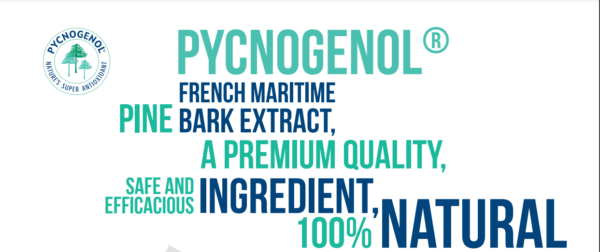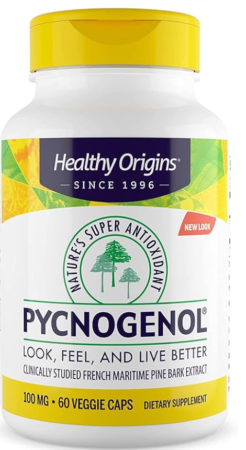| Studies have shown that the biggest benefits from pycnogenol are related to heart health, lowering blood pressure and increasing circulation. There is also proof that it can help lower blood glucose in diabetics. And I’m investigating how it can help me manage my pain. Learn more about pycnogenol here. |
What Is Pycnogenol?
The name is actually a proprietary name owned by the company Horphag Research. The supplement is made from extract of the French Maritime Pine Bark. The Horphag company was founded in 1925 in Germany and began research into pycnogenol in 1965. The company’s founder was a visionary in considering “healthy aging”.
He developed a water soluble flavonoid (large phytonutrients) that was extracted from the French Maritime Pine bark. That product became pycnogenol. The company continues to research and develop pycnogenol.
So pycnogenol was the name given to this bark extract. The extract is made from the water soluble content of the pine bark. It contains a high amount of bioflavonoids. Bioflavonoids are plant based compounds that appear to assist in the body’s circulatory system. It is a natural antioxidant which can promote cell health, as well as an anti-inflammatory.

What Are the Health Benefits of Pycnogenol?
The popular claims center around the benefits of the circulatory system, enhancing blood flow. But because pycnogenol contains anti-inflammatory properties, it can affect diseases that cause inflammation.
From my research I found these claims:
- Decrease allergies and asthma symptoms
- Lower blood pressure
- Protect against heart disease
- Reduce arthritis pain
- Help manage diabetes
- Help lower bad cholesterol
- Provide healthier looking skin
Much of these claims do not have enough scientific evidence to say they are in fact true. But small studies have been done which do back up the claims.
What About Pain Relief?
My main interest was to see if it would help me manage my pain. I was pleased to find a study reported by The National Institutes of Health, where there was scientific data stating that a 100 mg dose of pycnogenol provided better physical activity and pain relief for people with osteoarthritis!
This is very encouraging to me. My pain will always be chronic, but if I can manage some of the secondary issues with something like pycnogenol, I am going to give it a try. So I’m adding:
- May decrease pain, especially in individuals with osteoarthritis
If you want to read the article click on the title link here: Review on Sustained Relief of Osteoarthritis Symptoms with a Proprietary Extract from Pine Bark, Pycnogenol.
A Personal Testimony
I’ve been taking pycnogenol for years now. I have had fibroid cysts in my breasts for years. After taking pycnogenol on a regular basis, I was pleased to hear my doctor say that they were gone! When she asked what I did, I told her I had started to take pycnogenol.
She stated that she had heard about it, and affirmed that pycnogenol could probably have helped in this situation. I’m a believer!
Are There Side Effects From Pycnogenol?
Some side effects were noted. They include dizziness, upset stomach, and vertigo. Furthermore, if you have blood disease issues, pycnogenol may not be for you. It appears to stimulate the immune system and could affect lupus sufferers, multiple sclerosis and rheumatoid arthritis.
Check with your doctor to determine if you should try this supplement. Because we all have to be responsible for what we put into our bodies. And since supplements are currently not regulated by the FDA, we have even more of a responsibility to be careful.
How It May Help Pain
Since pycnogenol acts as an anti-inflammatory, it reduces the body’s inflamed tissue, which may be causing pain in the affected area. In the above study, joint pain that was due to osteoarthritis was relieved by the pycnogenol.
My pain is nerve related, so I don’t expect pycnogenol to help with managing it. But I do expect it to reduce related inflammation in the surrounding tissues. And since I am a senior citizen, I expect to look a little healthier.

What Is the Proper Dosage?
As we know, supplements are not regulated by the FDA, so a recommended dosage is not known. However, in the above study, 100 mg per day was seen to provide results. Once you discuss with your doctor, I think it is a good idea to start off slowly to make sure you don’t have any negative side effects.
Other foods that fight inflammation are fish, leafy greens, pears, bell peppers, black tea and olive oil. Red wine also contains resveratrol, which fights inflammation. So you can gain similar benefits from these foods. And they are healthy foods, so you can enjoy them and not worry about side effects.
In the US, suppliers of pycnogenol are GMP-certified which ensures that the product meets quality standards. I think it is important that you buy pycnogenol that has that certification.
Grape Seed vs French Maritime Pine Bark
Grape seed extract is also promoted to have the same benefits as pycnogenol. If you prefer, you can try the grape seed extract as well.
I have another article where I discuss the anti-inflammatory properties of turmeric. You can read it here for more information. Will Turmeric Help My Pain? Yes, According to Science.

Disclaimer
I am not a doctor, and therefore, want to make sure you speak to your physician before you start taking pycnogenol. This article is informational, and not meant to be medical advice. I present the research I have done so we can all make informed decisions.
I have an affiliate agreement with Amazon, and have researched their pycnogenol products. Healthy Origins is one of their Best Sellers. If you purchase this product through this link, I receive a small referral fee.
Conclusion
Have I answered your questions? If not, please leave a comment, and I will do my best to find the answer. If you have used pycnogenol, and found it to be effective, please tell us about it.
